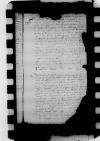List #2472
[Ioannes DANTISCUS] do UNKNOWN [Ermland (Warmia) Canon]Heilsberg (Lidzbark), 1541-07-26
Regest polski:
Poprzedniego dnia do Dantyszka dotarł zarówno posłaniec od adresata, jak i list z Rzymu od siostrzeńca Kaspara [Hannaua], zawierający oczekiwane materiały. Dantyszek prosi o opinię na ich temat.
Uważa, że obecność adresata przy rewizji granic jest niezbędna, ponieważ posiada on większe doświadczenie niż pan Georg [Donner?, Preucken?]. Byłby bardzo zadowolony, jeśli adresat za pośrednictwem swojego brata lub innych osób nakłoniłby księcia [Albrechta Hohenzollerna] do odstąpienia od tej sprawy. Dantyszek ma świadomość, do czego doprowadzi ta rewizja.
Dołącza kopię swojej odpowiedzi na list Dietricha [von Rheden]. Pozostawia osąd adresatowi, czy przesłać do Dietricha von Rheden mandaty królewskie oraz listy króla do papieża [Pawła III] i kardynała [Antonia Pucciego]. Zdaniem Dantyszka wzbudzą one w nim nie odwagę, lecz lęk.
Prosi o przekazanie pozostałych listów kanonikom warmińskim, do których zostały zaadresowane.
W postscriptum wspomina, że poprzedniego dnia otrzymał załączone nowiny. Zwraca przy tym uwagę, że adresat nie odpisał mu w sprawie węgorzy.
Rękopiśmienne podstawy źródłowe:
Pomocnicze podstawy źródłowe:
| ||||||
Tekst + aparat krytyczny + komentarz Zwykły tekst Tekst + komentarz Tekst + aparat krytyczny
Venerabilis Domine, frater carissime.
Salutem et felicitatem.
Commodum heri puer Dominationis Vestrae appulit, cum mihi cf.
Ad lustrandos limites praesentia Dominationis Vestrae est necessaria, quae iis in rebus plus, quam dominus Georgius, versata est. Si posset vel per fratrem, aut quoscumque alios efficere, ut ab hoc coepto dominus
Venerabili domino
Quae feliciter v[aleat].
[Ex]
Postscript:
Nova inclusa heri accepi. De anguillis Dominatio Vestra non rescripsit. Eas non nisi pretio hab....
